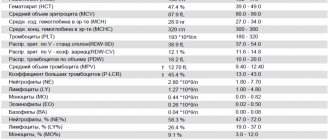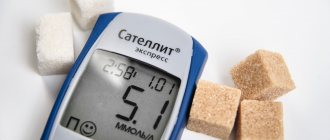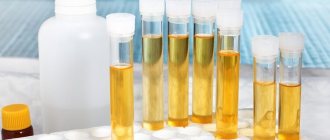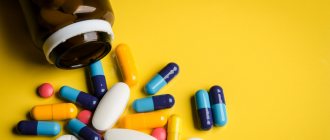General rules for preparing for blood tests
In all cases, before donating blood, it is recommended to adhere to several rules:
- Blood is donated in the morning on an empty stomach (or in the afternoon and evening, 4-5 hours after the last meal). Blood counts can change significantly throughout the day, so it is recommended that all tests be taken in the morning.
- Do not eat fatty foods several hours before the test, it is advisable not to eat for 4 hours - a high concentration of fats in the blood can interfere with any test.
- Shortly before taking blood, drink 1-2 glasses of ordinary still water; this will reduce the viscosity of the blood, and it will be easier to take a sufficient volume of biomaterial for research; in addition, it will reduce the likelihood of clots forming in the test tube.
- If possible, stop taking medications at least a day before the test.
- When taking tests while taking medications, you must indicate this fact on the referral form.
- It is recommended not to exercise on the day of the test.
- On the day of the test, it is recommended to exclude increased emotional stress.
- On the day of the test, it is recommended to take a comfortable position (sit down), relax, and calm down a few minutes before taking blood.
- Avoid drinking alcohol for 72 hours before taking the test.
- Do not smoke at least 30 minutes before blood collection.
- Clarify the optimal days of the menstrual cycle (or pregnancy period) for donating blood for sex hormones.
- FSH is follicle stimulating hormone. A woman should be tested for this sex hormone on days 3-7 of the cycle. To determine the possibility of follicle growth, FSH is taken on days 5-8 of the cycle;
- LH – luteinizing hormone. LH in men is responsible for increasing the permeability of the seminiferous tubules to testosterone. LH in women ensures completion of egg maturation in the follicle and ovulation, secretion of estrogen and formation of the corpus luteum. Women should undergo a blood test for LH on days 3-8 of the cycle;
- Prolactin . If prolactin levels are elevated in a man, sexual function may be impaired. In women, prolactin takes part in the ovulation process and stimulates lactation in the period after childbirth. To determine the level of this hormone, the analysis should be carried out in phases 1 and 2 of the menstrual cycle, and the sample should be taken only in the morning on an empty stomach. Before blood sampling, the patient is recommended to spend 30 minutes at rest, since prolactin is a stress hormone, as a result of which slight physical activity or anxiety can affect its level;
- Estradiol . In women, analysis can be taken at any phase of the menstrual cycle. Estradiol in women ensures the formation and regulation of menstrual function and the development of the egg;
- Progesterone . This hormone is responsible for ensuring the final preparation of the uterine lining for the embryo to attach. Progesterone provides optimal conditions for pregnancy to develop. The test is scheduled for days 19-21 of the menstrual cycle;
- Testosterone . Testing of this hormone in women can be carried out on any day of the cycle. If a man’s concentration has decreased, this entails a decrease in sperm quality and insufficient virility;
- DHEA sulfate . If the concentration of the hormone is increased in a woman, this may cause disruption of the ovaries and infertility. A woman’s hormone levels can be checked on any day of her cycle.
General rules
- For most studies, it is recommended to donate blood in the morning, from 8 to 11 o’clock, on an empty stomach (at least 8 hours must pass between the last meal and blood collection, you can drink water as usual), and on the eve of the study, have a light dinner with limited intake of fatty foods. For tests for infections and emergency studies, it is acceptable to donate blood 4-6 hours after the last meal. If you are taking medications, be sure to notify your doctor.
- Donate blood for gastrin-17, lipid profile (total cholesterol, HDL cholesterol, LDL cholesterol, VLDL cholesterol, triglycerides, lipoprotein (a), apolipoprotein A1, apolipoprotein B) and glucose tolerance test should be strictly on an empty stomach, after 12-14 hours hunger.
- 24 hours before the test, you must avoid alcohol, intense physical activity, and taking medications (in consultation with your doctor).
- 1-2 hours before the test, you must refrain from smoking, do not drink juice, tea and coffee, and you can drink still water. Avoid physical stress (running, quickly climbing stairs), emotional excitement. It is recommended to rest and calm down 15 minutes before donating blood.
- You should not donate blood for laboratory testing immediately after physiotherapeutic procedures, instrumental examination, X-ray and ultrasound examinations, massage and other medical procedures.
- When monitoring laboratory parameters over time, it is recommended to conduct repeated tests under the same conditions - in the same laboratory, donate blood at the same time of day, etc.
- Blood for research must be donated before starting to take medications or no earlier than 10-14 days after stopping them. To assess the control of the effectiveness of treatment with any drugs, a study should be conducted 7-14 days after the last dose of the drug.
General rules for preparing for urine tests
Single sample urine tests
Depending on the required laboratory tests, the first, middle, third (usually morning) or “one-time” (independent of the collection sequence) portion of urine can be used for analysis. Urine for testing is collected by the patient in a sterile plastic container.
To obtain reliable results, it is recommended to comply with the following conditions:
- It is not recommended to consume on the eve of the study (10–12 hours before): alcohol, spicy, salty foods, foods that change the color of urine (for example, beets, carrots);
- If possible, avoid taking diuretics;
- Before taking the test, perform a thorough toileting of the external genitalia;
- For women, the study is recommended to be carried out before menstruation or 2 days after its end;
- The PCR method for diagnosing urogenital infections in urine is suitable exclusively for men; in women, this diagnostic method is much inferior in its information content to the study of a urogenital smear and is not used.
Daily urine tests
urine sample is all urine collected over a 24-hour period.
Daily urine is most often collected by the patient independently at home using a special kit for collecting and transporting a daily urine sample. Before the collection begins, the patient is given the necessary instructions about the collection procedure and the necessary measures to prepare for the test.
To obtain reliable results, it is recommended to comply with the following conditions:
- It is not recommended to consume on the eve of the test (10–12 hours before): alcohol, spicy, salty foods, foods that change the color of urine (for example, beets, carrots).
- If possible, avoid taking diuretics.
- Before taking the test, perform a thorough toileting of the external genitalia.
- For women, testing is not recommended during menstruation.
Where do they get it from?
Usually from a finger. To do this, one of the fingers, usually the ring finger (since a large blood vessel approaches it), is lubricated with an antiseptic, a puncture is made up to three millimeters deep, and the blood is collected on glass and in a test tube.
Less commonly, from a vein: they tighten the forearm with a tourniquet, pierce the vessel in the elbow area and collect it in a flask. This method is less painful and is usually used in commercial laboratories.
In 2015, scientists from Rice University (USA) proved that the standard method of drawing blood from a finger is not informative. The small volume of biological material does not allow one to accurately determine the level of hemoglobin, and for 40% of diseases, the volume of blood tested must be at least 20 ml. Biological material from the vein is sufficient for clinical tests and obtaining reliable results.
pixabay.com/
General rules for preparing for stool tests
To collect and transport stool, the patient is given a sterile plastic container with a spoon. The container may contain a nutrient medium (peptone) or a preservative, depending on the type of study.
The release of helminth eggs and protozoan cysts in feces directly depends on the life cycle of the parasites. For this reason, the test results may be negative even if infection is present. For the most reliable results, three stool examinations are recommended with an interval of 3–7 days.
Tests for medical records
Teachers, cooks, doctors, and salespeople cannot work without proof of their health status in a medical record. In addition, this data needs to be updated every 1–4 years. In a regular clinic you will not be able to undergo a full medical examination; you can only undergo some tests. Where can I officially and quickly obtain a medical record and how much will this document cost?
The cost of a medical book depends on the list of doctors and tests that are necessary to obtain it. The average price is 1500–5000 rubles.
- Who is required to take tests for a medical record?
- What tests are needed for a medical record?
- Tests for medical records of food production workers
Microbiological and PCR studies
- The study is recommended to be carried out before starting antibiotics and other antibacterial chemotherapy drugs (if this is not possible, then no earlier than 12 hours after discontinuation of the drug).
- Avoid taking laxatives, administering rectal suppositories, oils, limit taking medications that affect intestinal motility (belladonna, pilocarpine, etc.) and drugs that affect the color of stool (iron, bismuth, barium sulfate) for 72 hours before stool collection .
- The material obtained after an enema, after taking radiopaque substances (barium during X-ray examination) is unsuitable for research.
General clinical and antigen studies
- Avoid taking laxatives, administering rectal suppositories, oils, limit taking medications that affect intestinal motility (belladonna, pilocarpine, etc.) and drugs that affect the color of stool (iron, bismuth, barium sulfate) for 72 hours before stool collection .
- The study should be carried out before performing sigmoidoscopy and other diagnostic procedures in the intestines and stomach.
- To test stool for occult blood, exclude meat, fish, green vegetables, and tomatoes from the diet for 72 hours before the test.
Urogenital urethral smear in men
- For 2 weeks before the study, exclude the local use of antiseptics and/or antibacterial and antifungal drugs.
- For 3 hours before the examination, refrain from urinating and do not toilet the external genitalia.
- It is recommended to analyze a urogenital smear in a man no earlier than 2 weeks after taking antibacterial drugs.
- In men with urethral discharge, the surface of the glans and the external urethral meatus should be cleaned with a gauze pad and the foreskin pulled back to prevent contamination.
Method capabilities
Clinical analysis of capillary blood includes determination of hemoglobin concentration, number of erythrocytes, leukocytes and platelets, hematocrit and erythrocyte indices (MCV, RDW, MCH, MCHC), blood formula (percentage of different types of leukocytes (neutrophils, lymphocytes, eosinophils, monocytes, basophils)).
Additionally, if necessary, the erythrocyte sedimentation rate (ESR) is measured. During medical examinations and clinical examinations, glucose levels are measured using capillary blood and rapid tests of cholesterol levels are performed.
General rules for preparing for sputum tests
- The patient collects sputum independently through deep coughing.
- Sputum collection is recommended to be carried out in the morning.
- Before collecting sputum, it is recommended to brush your teeth and rinse your mouth and throat with boiled water.
- Smears (scrapings) from the surface of the cervix (external uterine pharynx) and cervical canal for atopy.
- It is advisable to take smears no earlier than on the 5th day of the menstrual cycle and no later than 5 days before the expected start of menstruation.
- You cannot obtain smears within 24 hours after sexual intercourse, the use of lubricants, vinegar or Lugol's solution, tampons or spermicides, douching, insertion of medications, suppositories, creams into the vagina, including gels for ultrasound examination.
- In case of acute infection, it is advisable to obtain material for the purpose of examination and identification of the etiological agent; after treatment, but not earlier than 2 months, cytological control is necessary.
General rules for preparing for hair analysis
Scalp hair is the most preferred biomaterial for research. Hair from other areas of the body should only be used if there is no hair on the head.
- Stop using hair treatments 2 weeks before submitting your hair for analysis. Dyed, bleached, permed hair is not suitable for research. You must wait until enough hair has grown back to collect a hair sample.
- Hair should be clean and dry (it is advisable to wash your hair no later than 24 hours before collecting hair). Before the study, it is not allowed to apply any cosmetic or medicinal products (creams, oils, gels, etc.) to the hair.
- Avoid professional contact of hair with external contaminants (welding, mining) between shampooing and hair collection.
- Before collecting hair, thoroughly wash and dry your hands and scissors.
Microelements and vitamins
Not everyone knows that microelements and vitamins are not the same thing. Microelements are inorganic substances that are significant for humans - all living organisms have them, but their quantity is minimal (up to 0.1% of body weight) [16] Skalny A. V. et al. Bioelementology: basic concepts and terms. URL: https://window.edu.ru/. In turn, vitamins are organic substances that are also important for each of us. In case of deficiency of any of the biologically significant substances in the body, dangerous pathological changes can occur. The lack of one or another element can be revealed by analysis.
Both a lack and an excess of vitamins and microelements are dangerous for the human body. The latter can happen due to the uncontrolled use of dietary supplements, which many people now prescribe to themselves.
- When should you get tested?
- How are tests performed?
- Decoding the results







